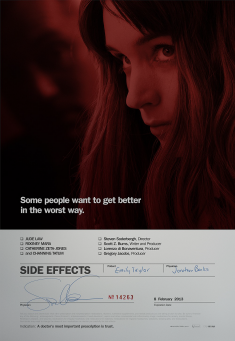Print Edition: February 20, 2013
 [It is impossible to discuss Side Effects without getting into details that a first-time viewer probably wouldn’t want to know. Unless you hate surprises.]
[It is impossible to discuss Side Effects without getting into details that a first-time viewer probably wouldn’t want to know. Unless you hate surprises.]
By the time Side Effects’ opening credits have concluded, the audience has already been witness to two lies, text-based. The commonly-known pseudonyms of Mary Ann Bernard as editor and Peter Andrews as cinematographer for director Steven Soderbergh will hold no meaning for those expecting a conventional credit open, yet their unhidden nature for those who have even a slight idea of what Soderbergh tends to do means it is a lie out in the open, exposed and in continued use, not despite, but in tandem with its fairly widespread knowledge.
A topic as wide and uneditable as the truth/lie quotient in human behaviour could appear to be one with diminishing returns. No matter how many approaches there may be (from his breakout debut Sex, Lies, and Videotape, to the heist-with-vocabulary Ocean series, to the cover-ups and investigations of Erin Brockovich and The Informant) there is the eventual dead end of irresolution. Lies lead to more lies which lead to nothing save the promise of a new generation (Contagion, Magic Mike). But Soderbergh finds something attractive, something solid and workable in this atmosphere, and so Side Effects, in what may or may not turn out to be his final film released to theatres, begins and ends in this mode.
Martin (Channing Tatum) is nearing the end of his prison sentence for the crime of insider trading, Emily (Rooney Mara) is nearing the end of her ability to wait on the outside in silence, Dr. Banks (Jude Law) is the psychiatrist that might open up a closed connection, make life a possibility. The “outside” for Emily is a barrier of mental imposition, dislocation, the ability to see what should be and the knowledge her world is not. As in their previous collaboration, Contagion, Scott Z. Burns provides Steven Soderbergh with a precise vocabulary that is unsparing in its dissection of the reality of the consequences of a particular ailment – in this case a form of depression.
The “structure that helps with hopelessness,” the “construction of a future,” this is what is said of Banks’s services, the spoken exchange of therapy, but what Soderbergh is really concerned with, and eventually lifts out of this setting and into another, is the contract of trust in this or any relationship.
By the introduction of other ways of looking, other ways of interpreting, Soderbergh punctures Side Effects’ narrative, his own, the one that moved with momentum and tension and uncertainty. The doctor-patient relationship is a fragile one to begin with—to invest an entire life story, an entire person, a body, into the care of another—and it is a deal that Side Effects’ narrative misses no opportunity to hint at duplicity within. The beneficiaries of medication, the selling of stories and the changeability of personality are all moving parts Soderbergh trains with a cynical eye. Amongst the canopy of fine-tuned media and speech, what really stood out in Contagion was the way he took a realistic situation and extrapolated it to his own concerns. But here there is a game to be played between actor and audience – allowing sight of what is being moved toward while obscuring the truth of what is being seen.
As Side Effects moves and changes, what it diverges from (itself) and what it arrives at (an opened-up piece of itself) presents points of conflict. In its use of, rather than narrative based on the experience of a person suffering from mental illness, Side Effects walks a line that converges with the film that also happened to be crashing, sound-wise, through the walls of the theatre the next room over – Silver Linings Playbook.
Silver Linings Playbook also uses the sensory details of mental illness, folding it into a recognizable genre, editing it into a rhythm that possesses a musicality that can only come extra-diegetically (there Dylan and Cash and Brubeck, here Thomas Newman). There’s even the coincidence of both films holding a conversation about the treatment of, the provision of, help to its main female character, while as a larger narrative the same discussion could be had about who is in control of events. That Soderbergh moves away from any association with the truth of any experience though, means there is the unconventional attitude of discarding all prior knowledge, good included, and the shift to a new perspective of ironically viewing main characters fumble though and with information just about everyone else already holds (something that is the opposite of the extension present in Silver Linings Playbook, even on re-watches). Side Effects never looks back, and we’re left to relish or become re-accustomed to this new search. Lies have made further questions pointless.
If this is Soderbergh’s final release, then to leave things on a note of defeat, of negation, is to a degree fitting, but only as a detriment. Deception, like any conflict beginning that’s said to be necessary in narrative, serves as disruption, but the way Soderbergh uses it, it is necessarily woven into every exchange. It is a possibility. It is the norm. Side Effects then, for all its trickery, ends up as a more conventional movie – in its surprising shift it becomes less surprising, for what could be less interesting than a crime picture where the only motivation is passion-less capital, and what could be more disappointing than the halting of Soderbergh’s digital outgrowth, which builds in the first half until a crash to black – from then Soderbergh’s cutting is less sharp, details less pronounced, paths not pursued to their end but wrapped up into the convenience of plot and games.


